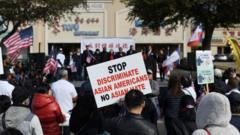Is Texas Prioritizing National Security or Fueling Xenophobia with Property Restrictions on Chinese Nationals?

Published: 2025-08-28 23:42:25 | Category: technology
Texas Senate Bill 17, set to take effect on 1 September 2025, restricts ownership of property for individuals and companies from China, Iran, North Korea, and Russia. While officials assert it aims to protect national security, critics argue it fosters discrimination, particularly against Asian and immigrant communities, highlighting concerns over its economic impact and potential violation of civil rights.
Last updated: 29 October 2023 (BST)
Key Takeaways
- SB 17 restricts property purchases by individuals from designated countries, including China.
- Critics label the bill as discriminatory and reminiscent of historic anti-Asian laws.
- At least 120,000 Chinese nationals in Texas may be affected, raising concerns about their rights.
- Economic repercussions may arise for local businesses reliant on Chinese clientele and investment.
- A lawsuit challenging the bill was dismissed, but appeals are being pursued.
Understanding SB 17: The Legislative Landscape
In June 2023, Texas Governor Greg Abbott signed Senate Bill 17 into law, citing it as the "toughest ban in America" against foreign adversaries. This legislation is designed to prevent certain nations from purchasing property in Texas, a significant move in the state's ongoing narrative regarding national security and economic protectionism.
The law specifically targets individuals and companies from China, Iran, North Korea, and Russia, raising questions about its implications for Texas's diverse population. With the Chinese community being one of the largest immigrant groups in the state, many view this legislation as a direct attack on their rights and livelihoods.
The Historical Context of Property Ownership for Chinese-Americans
The struggle for property ownership rights among Chinese-Americans dates back over a century. The Chinese Exclusion Act of 1882, for instance, was a landmark piece of legislation that barred Chinese labourers from immigrating to the United States. This act laid the groundwork for a history of discrimination that has continued in various forms over the decades.
In Texas, previous alien land laws, which restricted non-US citizens from purchasing land, were only repealed in 1965. These laws were deemed discriminatory and detrimental to economic development. The recent SB 17 has sparked fears that history is repeating itself, with potential ramifications for both the rights of individuals and the economic landscape of Texas.
The Economic Impact of SB 17
The economic implications of this law extend beyond personal property ownership. Businesses that rely heavily on the Chinese community and investment are already feeling the strain. Jason Yuan, a car shop owner and community activist, expressed concerns that one-third of his clientele consists of Chinese immigrants. He fears this legislation could disrupt the economic ecosystem that small business owners depend on.
Recent reports indicate that between 2011 and 2021, Chinese companies contributed significantly to Texas’s economy, with $2.7 billion in capital investments and over 4,600 jobs created. However, in light of SB 17, many Chinese businesses are reconsidering their plans to invest in Texas. Nancy Lin, a commercial estate agent in Dallas, noted that potential Chinese investors are pausing their investment strategies due to the uncertainty created by the bill.
The Legal Battle Against SB 17
Opponents of SB 17 have mounted legal challenges to contest its constitutionality. The Chinese American Legal Defense Alliance (CALDA) filed a lawsuit on behalf of several visa holders, arguing that the law unfairly discriminates against them based solely on their nationality. However, a judge dismissed the case, stating that the plaintiffs would not be personally affected by the law, a ruling that has incited further discontent among those within the community.
The dismissal has not deterred CALDA from pursuing an appeal, as concerns about the law's vague legal definitions and potential for discrimination remain prevalent. The uncertainty surrounding the law has left many visa holders in limbo, unsure of their rights and the future of their property ownership.
The National Security Argument
Supporters of SB 17, including Governor Abbott, argue that the legislation is necessary to safeguard state and national security. They cite concerns over foreign influence and potential espionage, particularly from China. Chuck DeVore from the Texas Public Policy Foundation has emphasised the need to keep "hostile regimes" away from critical infrastructure and military installations.
However, critics, including representatives from the American Civil Liberties Union (ACLU), contend that equating Chinese nationals with the Chinese government is unjustified. They argue that there is no substantial evidence to suggest that individuals from these countries owning property poses a genuine threat to national security. This debate over the bill highlights the broader tensions surrounding US-China relations and the rising sentiment against foreign ownership in the wake of geopolitical tensions.
The Community Response and Activism
Activists like Jason Yuan are mobilising against SB 17, drawing parallels between the current legislation and historical discriminatory laws. Yuan publicly labelled the bill as the "Chinese Exclusion Act of 2025," invoking a painful chapter in American history to highlight the perceived injustices faced by the Asian community today. His activism has included leading rallies and providing testimony to lawmakers, advocating for the rights of Chinese-Americans and urging others to join the fight.
Yuan's concerns are not solely about property rights; they extend to the future of his children and the message such laws send about acceptance and belonging in America. The sentiment among many within the community is that if they do not stand up against such discrimination, further laws could emerge, perpetuating a cycle of exclusion and prejudice.
Looking Ahead: What’s Next for Texas and its Communities?
The future of SB 17 remains uncertain as legal battles continue and public sentiment evolves. The potential for similar legislation in other states, like Ohio, indicates that the issue of foreign property ownership will likely remain at the forefront of political discourse. Activists and community leaders are urging collective action to challenge the narrative that fuels such laws, advocating for a more inclusive approach that respects the rights of all residents, regardless of their nationality.
As the situation develops, the implications for Texas’s economy, community dynamics, and civil rights will be closely watched. The outcomes of ongoing legal challenges and public activism may define the landscape for future generations of immigrants in Texas and across the United States.
FAQs
What is Texas Senate Bill 17?
Texas Senate Bill 17 restricts property ownership and rental for individuals and companies from China, Iran, North Korea, and Russia, citing national security concerns.
When does SB 17 take effect?
SB 17 is set to take effect on 1 September 2025.
Who is affected by SB 17?
The bill primarily affects individuals and companies from the four designated countries, particularly impacting the Chinese community in Texas, which numbers over 120,000.
What are the potential penalties for violating SB 17?
Violators of SB 17 could face fines exceeding £193,000 (approximately $250,000) or possible jail terms.
Has there been a legal challenge against SB 17?
Yes, the Chinese American Legal Defense Alliance filed a lawsuit challenging the law, but it was dismissed, prompting an appeal.
What are the arguments for and against SB 17?
Supporters argue it protects national security, while opponents claim it discriminates against Asian communities and lacks evidence linking property ownership to security threats.
As Texas navigates these turbulent waters, the implications of SB 17 could resonate far beyond its borders. The outcome of this legislative effort may well set a precedent for how immigration and property rights are addressed in the future. #TexasLaw #CivilRights #PropertyOwnership



